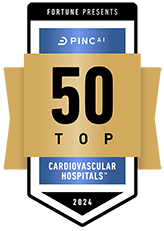Coronary Artery Bypass Grafting (CABG) involves removing healthy arteries and/or veins from one part of the body and attaching or grafting them to the coronary artery to restore blood flow to the heart.
Following are some of the bypass surgery techniques for treating coronary artery disease.
Traditional CABG. Involves making a 6- to 8-inch incision down the center of the chest, cutting the breastbone (sternum) and opening the chest to reach the heart. One or more healthy arteries and/or veins are removed from another part of the body, often the leg. The surgeon attaches the blood vessel(s) to the coronary artery above and below the narrowed or blocked area. The grafted vessel bypasses the blocked portion of the coronary artery, allowing oxygen-rich blood to reach the heart. During the procedure, the heart is stopped, and a heart-lung machine keeps blood moving throughout the body.
Off-pump (“beating heart”) CABG. Like traditional CABG, beating heart surgery involves cutting through the sternum. This procedure, however, is done without stopping the heart or using a heart-lung machine. Instead, surgeons steady the part of the heart where a bypass is needed with a special device. The heart continues to pump blood to the body during surgery.
Minimally invasive CABG. Minimally invasive direct coronary artery bypass (MIDCAB) may be done when only one or two artery bypasses are needed. A 2- to 3-inch incision is made in the chest without splitting the sternum. Through the incision, the surgeon connects a bypass vessel to a diseased coronary artery. This surgery is performed without using a heart-lung machine.
Redo CABG. Over time (10 or more years), 10 percent to 15 percent of people who had CABG surgery need to have another bypass procedure. This may be caused by narrowing of the grafted arteries or worsening of the person’s coronary artery disease.
Endovascular vein harvesting. Traditionally, surgeons harvest a vein from the patient’s leg to use as the bypass graft. This procedure usually requires an incision the length of the patient’s leg. Our physicians are skilled at minimally invasive endovascular (or endoscopic) vein harvesting, a procedure that leads to less pain, fewer wound complications and a better cosmetic outcome.
Learn More About STS
Our Cardiovascular Program continues to receive recognition as one of the top programs nationally. We are honored to provide high-quality, effective care for even the most high-risk patients.
-
Check Out Our Heart and Vascular Program Awards and Recognition
In its 2024 Specialty Excellence Awards, Healthgrades recognized Froedtert Hospital as one of America’s 50 Best Hospitals for Cardiac Surgery, one of America’s 100 Best Hospitals for Cardiac Care and one of America’s 100 Best Hospitals for Coronary Intervention, as well as other specialty achievements in various areas.

For the second year in a row, Froedtert Hospital was identified as one of the nation’s 50 Top Cardiovascular Hospitals™ according to an independent quality analysis based on a balanced scorecard provided by PINC AI™, and reported by Fortune. The hospitals recognized in the top 50 operated at lower cost and had better outcomes, recording significantly higher inpatient survival rates, fewer patients with complications, lower readmission rates and up to nearly $10,000 less in total costs per patient case. According to the study’s analysis, if all hospitals operated at the level of this year’s top performers, there could be 7,600 fewer deaths due to heart disease, 6,700 fewer bypass and angioplasty patients who suffer complications, and more than $1 billion in costs saved for the 2024 study year. Froedtert Hospital was ranked in the category of top teaching hospitals with a cardiovascular residency program. In this cohort of hospitals, Froedtert Hospital was ranked No. 4 in the country. No other hospital in Wisconsin was recognized with this national distinction.
The Society for Vascular Surgery's Vascular Quality Initiative (SVS VQI) has awarded Froedtert Hospital three out of three stars for its active participation in the Registry Participation Program. The mission of the SVS VQI is to improve patient safety and the quality of vascular care delivery by providing web-based collection, aggregation and analysis of clinical data submitted in registry format for all patients undergoing specific vascular treatments. The VQI operates 14 vascular registries.
The American Heart Association recognized Froedtert Hospital with its Get With the Guidelines® Heart Failure Gold Plus Award. In addition, the hospital was recognized on the AHA’s Target: Heart Failure(SM) Honor Roll and received the AHA’s Target: Type 2 Diabetes Honor Roll™ award.
The American Heart Association also recognized Froedtert Hospital with its Get With the Guidelines® — Coronary Artery Disease Mission: Lifeline STEMI Receiving Silver Plus and Mission: Lifeline NSTEMI Silver awards. These awards demonstrate our commitment to improving care by adhering to the latest treatment guidelines and streamlining processes to ensure timely and proper care for heart attacks.
The American Heart Association recognized Froedtert Hospital with its Get With the Guidelines® AFib Gold Award.
The Cardiovascular Intensive Care Unit (CVICU) and Neurosurgical Intensive Care Unit (NICU) at Froedtert Hospital have each received a silver-level Beacon Award for Excellence from the American Association of Critical-Care Nurses. This award recognizes unit caregivers who successfully improve patient outcomes and align practices with AACN’s six Healthy Work Environment Standards. Receiving this national three-year award with gold, silver and bronze designations, marks a significant milestone on the path to exceptional patient care and achieving a healthy work environment.





